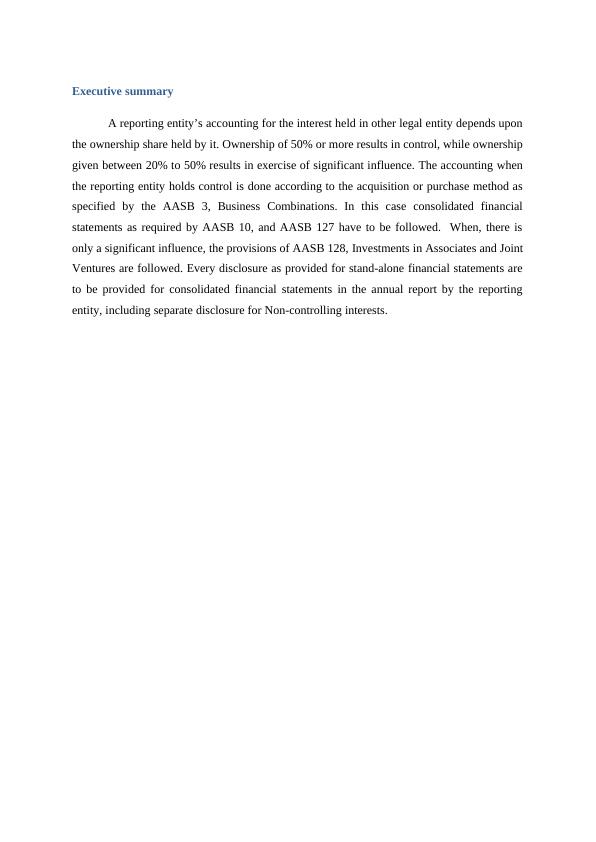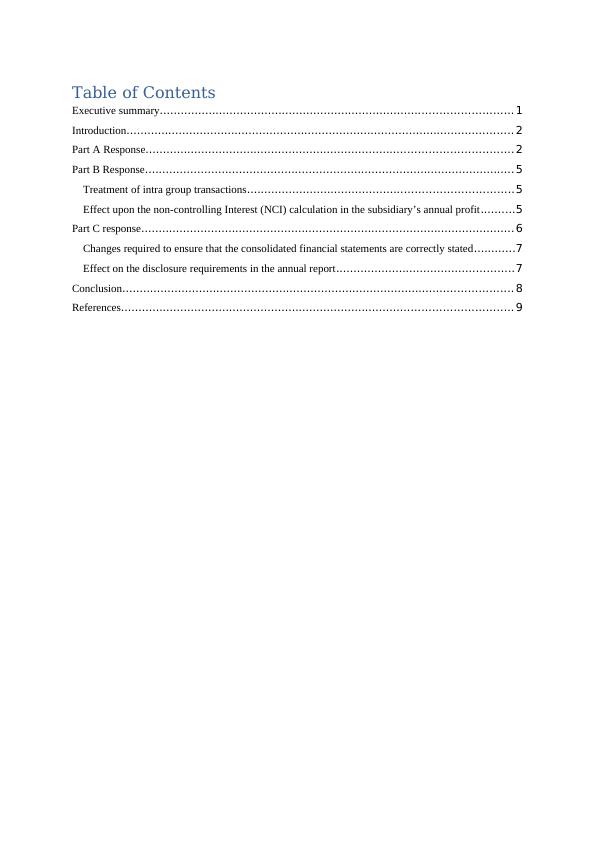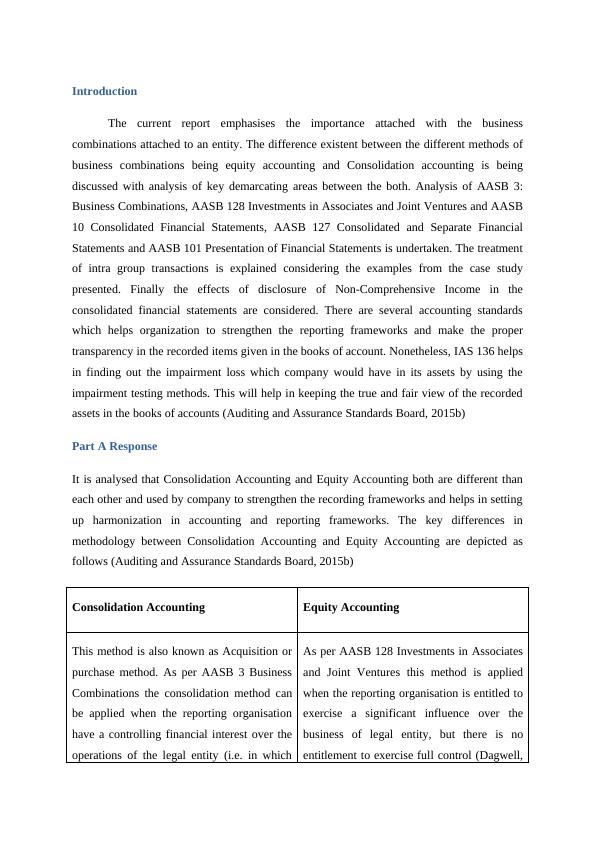Corporate and Financial Accounting: Consolidation vs Equity Accounting
Added on 2023-01-16
14 Pages3511 Words92 Views
Corporate and financial accounting
Module Number-
Module Number-

Executive summary
A reporting entity’s accounting for the interest held in other legal entity depends upon
the ownership share held by it. Ownership of 50% or more results in control, while ownership
given between 20% to 50% results in exercise of significant influence. The accounting when
the reporting entity holds control is done according to the acquisition or purchase method as
specified by the AASB 3, Business Combinations. In this case consolidated financial
statements as required by AASB 10, and AASB 127 have to be followed. When, there is
only a significant influence, the provisions of AASB 128, Investments in Associates and Joint
Ventures are followed. Every disclosure as provided for stand-alone financial statements are
to be provided for consolidated financial statements in the annual report by the reporting
entity, including separate disclosure for Non-controlling interests.
A reporting entity’s accounting for the interest held in other legal entity depends upon
the ownership share held by it. Ownership of 50% or more results in control, while ownership
given between 20% to 50% results in exercise of significant influence. The accounting when
the reporting entity holds control is done according to the acquisition or purchase method as
specified by the AASB 3, Business Combinations. In this case consolidated financial
statements as required by AASB 10, and AASB 127 have to be followed. When, there is
only a significant influence, the provisions of AASB 128, Investments in Associates and Joint
Ventures are followed. Every disclosure as provided for stand-alone financial statements are
to be provided for consolidated financial statements in the annual report by the reporting
entity, including separate disclosure for Non-controlling interests.

Table of Contents
Executive summary..................................................................................................... 1
Introduction............................................................................................................... 2
Part A Response......................................................................................................... 2
Part B Response.......................................................................................................... 5
Treatment of intra group transactions............................................................................5
Effect upon the non-controlling Interest (NCI) calculation in the subsidiary’s annual profit..........5
Part C response........................................................................................................... 6
Changes required to ensure that the consolidated financial statements are correctly stated............7
Effect on the disclosure requirements in the annual report...................................................7
Conclusion................................................................................................................ 8
References................................................................................................................ 9
Executive summary..................................................................................................... 1
Introduction............................................................................................................... 2
Part A Response......................................................................................................... 2
Part B Response.......................................................................................................... 5
Treatment of intra group transactions............................................................................5
Effect upon the non-controlling Interest (NCI) calculation in the subsidiary’s annual profit..........5
Part C response........................................................................................................... 6
Changes required to ensure that the consolidated financial statements are correctly stated............7
Effect on the disclosure requirements in the annual report...................................................7
Conclusion................................................................................................................ 8
References................................................................................................................ 9

Introduction
The current report emphasises the importance attached with the business
combinations attached to an entity. The difference existent between the different methods of
business combinations being equity accounting and Consolidation accounting is being
discussed with analysis of key demarcating areas between the both. Analysis of AASB 3:
Business Combinations, AASB 128 Investments in Associates and Joint Ventures and AASB
10 Consolidated Financial Statements, AASB 127 Consolidated and Separate Financial
Statements and AASB 101 Presentation of Financial Statements is undertaken. The treatment
of intra group transactions is explained considering the examples from the case study
presented. Finally the effects of disclosure of Non-Comprehensive Income in the
consolidated financial statements are considered. There are several accounting standards
which helps organization to strengthen the reporting frameworks and make the proper
transparency in the recorded items given in the books of account. Nonetheless, IAS 136 helps
in finding out the impairment loss which company would have in its assets by using the
impairment testing methods. This will help in keeping the true and fair view of the recorded
assets in the books of accounts (Auditing and Assurance Standards Board, 2015b)
Part A Response
It is analysed that Consolidation Accounting and Equity Accounting both are different than
each other and used by company to strengthen the recording frameworks and helps in setting
up harmonization in accounting and reporting frameworks. The key differences in
methodology between Consolidation Accounting and Equity Accounting are depicted as
follows (Auditing and Assurance Standards Board, 2015b)
Consolidation Accounting Equity Accounting
This method is also known as Acquisition or
purchase method. As per AASB 3 Business
Combinations the consolidation method can
be applied when the reporting organisation
have a controlling financial interest over the
operations of the legal entity (i.e. in which
As per AASB 128 Investments in Associates
and Joint Ventures this method is applied
when the reporting organisation is entitled to
exercise a significant influence over the
business of legal entity, but there is no
entitlement to exercise full control (Dagwell,
The current report emphasises the importance attached with the business
combinations attached to an entity. The difference existent between the different methods of
business combinations being equity accounting and Consolidation accounting is being
discussed with analysis of key demarcating areas between the both. Analysis of AASB 3:
Business Combinations, AASB 128 Investments in Associates and Joint Ventures and AASB
10 Consolidated Financial Statements, AASB 127 Consolidated and Separate Financial
Statements and AASB 101 Presentation of Financial Statements is undertaken. The treatment
of intra group transactions is explained considering the examples from the case study
presented. Finally the effects of disclosure of Non-Comprehensive Income in the
consolidated financial statements are considered. There are several accounting standards
which helps organization to strengthen the reporting frameworks and make the proper
transparency in the recorded items given in the books of account. Nonetheless, IAS 136 helps
in finding out the impairment loss which company would have in its assets by using the
impairment testing methods. This will help in keeping the true and fair view of the recorded
assets in the books of accounts (Auditing and Assurance Standards Board, 2015b)
Part A Response
It is analysed that Consolidation Accounting and Equity Accounting both are different than
each other and used by company to strengthen the recording frameworks and helps in setting
up harmonization in accounting and reporting frameworks. The key differences in
methodology between Consolidation Accounting and Equity Accounting are depicted as
follows (Auditing and Assurance Standards Board, 2015b)
Consolidation Accounting Equity Accounting
This method is also known as Acquisition or
purchase method. As per AASB 3 Business
Combinations the consolidation method can
be applied when the reporting organisation
have a controlling financial interest over the
operations of the legal entity (i.e. in which
As per AASB 128 Investments in Associates
and Joint Ventures this method is applied
when the reporting organisation is entitled to
exercise a significant influence over the
business of legal entity, but there is no
entitlement to exercise full control (Dagwell,

End of preview
Want to access all the pages? Upload your documents or become a member.
Related Documents
Auditing AASB 137lg...
|15
|3636
|58
Corporate Takeover Decision Making and the Effects on Consolidation Accountinglg...
|13
|3289
|460
Corporate and financial accountinglg...
|15
|3972
|59
Corporate and Financial Accounting: Fundamentals of Business Combination Methodologies, Acquisition Methods, and Intragroup Transactionslg...
|14
|3776
|140
Corporate and Financial Accountinglg...
|13
|3718
|320
Corporate and Financial Accountinglg...
|14
|3060
|120
